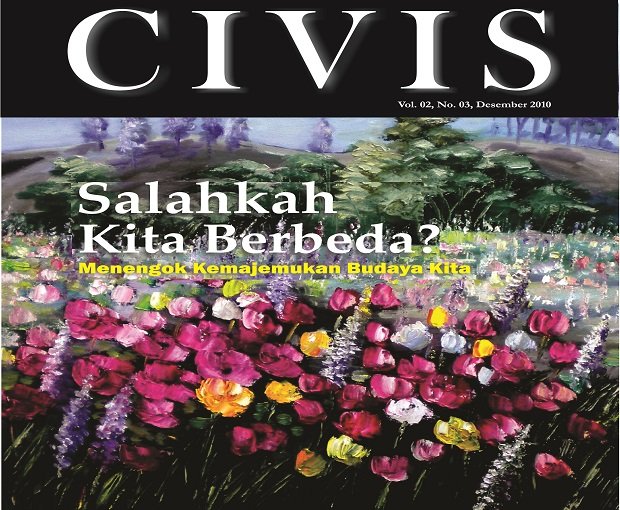
Civis Vol. 2, No. 3, Dec 2010
Do you prefer the cover of this edition’s CIVIS to be all black, all white, or any other single color? Surely most of us would prefer the painting a flower garden more, with its blend of beautiful colors. In the same vein, Eka Darmaputera also describes the people of Indonesia as a garden planted with colorful flowers. “The result, is not merely a garden with a clump of white flowers here, of red flowers in there, and purple flowers in another place”, but “a garden with flowers that are altogether red, white, and purple.” What beautiful scenery. Indonesia’s cultural diversity is a tremendous wealth. Other countries are touting their cultural property as an asset and national identity. On the contrary we are lacking in cultural management; a few even imposed “one color” culture to fit his personal definition.
In this edition, culturaI observers Nyoman Nuarta and Damien Dematra voice their concern. Sometimes “pluralism” is considered as a dangerous phenomenon of modernization. In fact, diversity is our reality since the founding of this nation. For example, consider the participants of the Youth Congress of 1928. There was Jong Java, Jong Sumatra, Jong Celebes, etc., but they all agreed on one country, nation, and uniting language.
In a similar spirit that goes beyond primordial interest to reach mutual interest, Andreas Yewangoe invites us to explore religious values and create a matrix of meaning, commonly accepted values that can be championed jointly by the community. Unfortunately, the efforts of society’s grassroots to forge unity amid diversity is often undermined by the intervention of the power elite (formal or informal) for the sake of political or economic interests, such as the Maluku conflict experience and the history of the Chinese society in this edition. Therefore, the state is obliged to promote anIndonesian culture that respects our diversity. Constitutional Amendment has emphasized this mandate, as described in Jakob Tobing’s article. In relation to this, Daisy Yasmine and Tobias Basuki try to trace the role of the state in influencing culture through public policy.
Indonesia was born with cultural diversity. Without it, there is no Indonesian. So let us learn to paint with colorful flower gardens on one canvas, Indonesia. The result is a masterpiece for you, me, and the next generation.

Matius Ho
Editor in Chief
After completing his undergraduate and graduate studies at the University of Wisconsin, Madison (USA) and the London Institute for Contemporary Christianity (UK) in 1997, Matius Ho joined the Accenture, a multinational consulting firm, and developed IT infrastructure in telecommunication and retail industries in Indonesia and Singapore. Afterwards, he was appointed as a Director in a manufacturing and export company. He served as the Vice Secretary of the Akademi Leimena Foundation, a precursor of the Leimena Institute, before co-founding the Institute in 2005.
